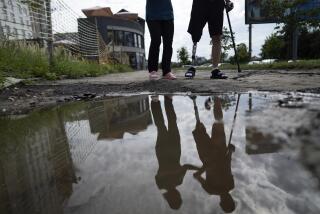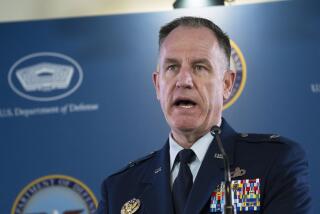For wounded veterans, there’s no forgetting war
- Share via
SAN ANTONIO — A year after Army Capt. Sam Brown was set ablaze when a bomb blew up his Humvee in Afghanistan, the 25-year-old West Point graduate endures a steady schedule of surgery and stretching to break up knotty burn scars.
He also has another routine: checking a website that counts U.S. and coalition troop deaths in Iraq and Afghanistan.
For Brown, it’s one more reminder that the wars have not ended -- something he says many Americans seem to have forgotten.
With the timetable set for withdrawal from Iraq and the fighting in Afghanistan in its eighth year, U.S. war coverage has waned, often pushed off the front page by the economy, healthcare and celebrity deaths.
But for severely wounded soldiers the wars are no distant memory.
“Unless you see it all the time, it’s just kind of easy not to remember,” Brown said. “The war is definitely not over.”
About 130,000 American troops are in Iraq, and the military plans to keep 100,000 there through January. About 62,000 troops are in Afghanistan, with 6,000 more headed there by the end of the year.
More than 5,100 U.S. troops have been killed in Iraq and Afghanistan. U.S. deaths in Afghanistan have reached record levels -- August was the deadliest month so far.
Still, polls show that while most Americans say Iraq and Afghanistan are important, many more fret about domestic concerns. An Associated Press poll in July showed a little more than 60% rated the wars extremely or very important, while 91% said the same about the economy.
Last month, an ABC News-Washington Post poll found that 51% of Americans said the war in Afghanistan wasn’t worth fighting.
Brown suffered third-degree burns over about a third of his body in a blast near Kandahar last September. The explosion killed a fellow soldier. Others helped put out the flames that charred Brown’s face, arms and back.
“I knew we had hit something pretty terrible. I was instantly on fire. I got out and I literally threw my arms in the air and said, ‘Jesus save me,’ ” Brown said as he lifted his arms to shoulder height -- as high as they would go because of the scars.
Brown goes daily to rehab at Brooke Army Medical Center in San Antonio, where about 600 war wounded seek care because of its specialized treatment for burn patients and amputees.
Although the Virginia soldier and others say they understand that most Americans don’t have regular exposure to soldiers and families affected by the wars, the waning interest can be disheartening.
“It’s not like it’s a waste if people don’t recognize me” as a wounded soldier, Brown said. But he said it felt as if many Americans had “kind of moved on.”
In San Antonio, wounded veterans say they are frequently recognized for their service and thanked by people in places such as the supermarket. Brooke has the Army’s only burn center and its only major amputee rehab facility outside Walter Reed Army Medical Center in Washington.
“The further out you are from military bases, the less aware you are of what’s going on,” said Army Sgt. 1st Class Ireshekia Henry, one of only about two dozen military women amputees. The 33-year-old mother of three lost part of her leg in a 2007 bombing in Iraq. “When I go home to Waco, I get the stares.”
Army Staff Sgt. Eric Cowin of Fayetteville, Ark., lost part of his left leg after an explosion June 9 while on one of the final U.S. patrols in Baghdad. He and his unit had already handed over control of their security station to Iraqi authorities, and it was so quiet in the weeks leading up to the attack that Cowin said he too thought the war was over.
Now, even watching TV can set off feelings that many Americans have moved on.
“Michael Jackson was just one man. He was one American and all he did was sing. The troops over there are getting shot up, or blown up, whatever. Nobody even hears about them anymore,” said Cowin, leaning on crutches in the workout room of the amputee rehab center at Brooke.
Army Staff Sgt. Shilo Harris, who was severely burned in a 2007 truck explosion that killed three friends, said after his first deployment ended in early 2005, the wars seemed to be more pressing. But the McCamey, Texas, father of four who joined the Army after the Sept. 11 attacks said the current focus on domestic concerns didn’t bother him.
“There are domestic issues that require a great deal of attention now. I agree with that, because our families need to be taken care of,” he said.
He added: “I know our soldiers won’t be forgotten. And I pray that Americans do not forget why we are fighting.”
More to Read
Sign up for Essential California
The most important California stories and recommendations in your inbox every morning.
You may occasionally receive promotional content from the Los Angeles Times.










